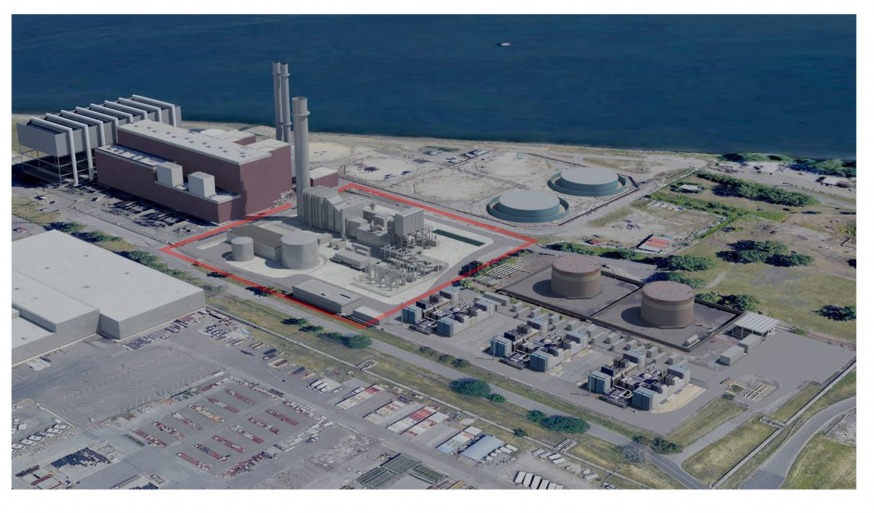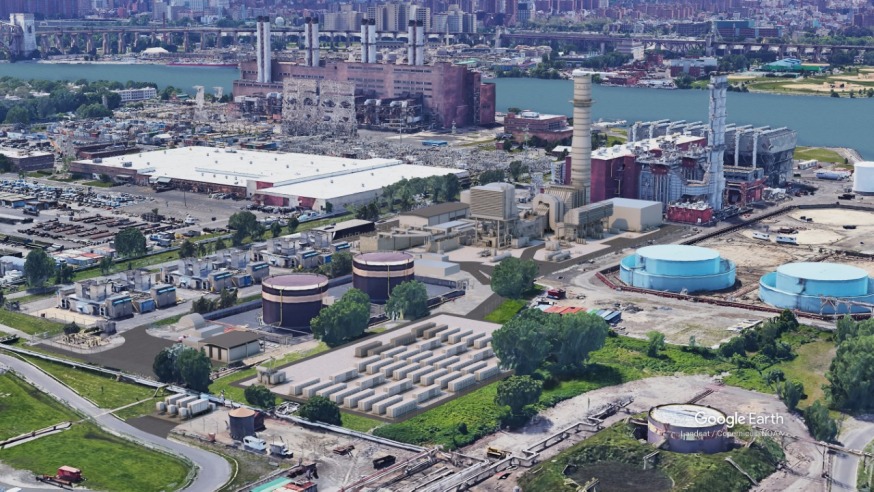
The NRG plant occupies 15 acres within the 300-acre ConEd complex (NRG)
March 17, 2022 By Allie Griffin
A large energy company that had its plans to build a power plant in Astoria rejected by the state in October has challenged the decision and in doing so has drawn the ire of local officials and activists.
NRG Energy is seeking the state’s approval to replace its 50-year-old peaker plant on 20th Avenue with a natural gas-fired generator that it says would significantly reduce its carbon footprint at the site.
The company’s application was denied by the New York State Department of Environmental Conservation in October and NRG requested an adjudicatory hearing in November.
Elected officials and climate activists, however, remain firmly opposed to the plan. They slammed the plan at a public hearing Tuesday.
State Sen. Michael Gianaris, who has been an outspoken critic of the plan since its inception, called on the Department of Environmental Conservation to uphold its initial denial of the project. The DEC concluded in October that the plan failed to comply with the state’s Climate Leadership and Community Protection Act, a 2019 law that established a mandate to limit greenhouse gas emissions.
“The DEC was right to deny a permit for a destructive, fossil fuel plant in Astoria and should reject their appeal as well,” Gianaris, who championed the law, said. “Our community drew a line in the sand against new fossil fuel infrastructure and won. Let the DEC issue a strong statement that ‘no new fossil fuel plants’ is the policy of New York as we fight the ravages of the climate crisis.”
However, NRG maintains that its plan would assist New York in reaching its sustainability goals by reducing the site’s existing carbon footprint by switching to a natural-gas-powered turbine. The company also said that the peaker plant, which acts as a backup power source when other plants fail, is needed to keep the city’s power grid running.
“The Astoria Replacement Project proposed by NRG would help address reliability gaps, while also helping New York meet its aggressive climate goals,” NRG spokesperson Dave Schrader said in a statement.

NRG’s proposed power plant (NRG)
Activists argued that the facility will still be dependent on fossil fuels, with NRG relying on natural gas obtained by fracking. They added that Queens residents oppose the plan and that it would pollute the area.
“More fracked gas in Astoria will force an increase in asthma-inducing toxins onto a community already overburdened by fossil fuel pollution and fly in the face of our state’s climate law,” said Laura Shindell, Senior NY Organizer with Food & Water Watch and member of a coalition fighting the plans. “Governor Hochul must side with people, not polluters, and once again reject Astoria NRG’s profiteering at our expense.”
Critics said the plant would continue to unfairly burden residents of Astoria and Queensbridge with pollution. The area has become known as “Asthma Alley,” since residents have higher-than-average rates of asthma and respiratory illnesses.
“Every day, I see my neighbors across Astoria suffer from some of the worst air quality in our city and we have the asthma rates to show for it,” Assembly Member Zohran Mamdani said. “Enough is enough; we are sick and tired of investments being made in dirty fossil fuels when we can build clean energy today.”
Astoria Council Member Tiffany Cabán said the pollution the plant would create would directly impact public housing tenants and lower-income families. Those groups, she said, should instead be some of the first to reap the benefits of clean energy.
“Astoria is a historically polluted community, home to lower-income families, immigrants, and public housing tenants that must be at the center of a just transition away from fossil fuels and towards equitable clean energy, housing, and transportation systems that address the harms caused by the fossil fuel industry,” Cabán said. “This plant proposal must not be revived.”
City Comptroller Brad Lander and State Sen. Jessica Ramos also testified against NRG’s plans at the hearing.
The lawmakers — and the DEC in its initial rejection — said the company’s plan to switch to natural gas violates the Climate Leadership and Community Protection Act. The act calls for an 85 percent reduction in greenhouse gas emissions by 2050, 100 percent zero-emission electricity by 2040 and 70 percent renewable energy by 2030.
However, NRG disagrees with the DEC’s findings.
“NRG is pursuing an adjudicatory hearing of the NYSDEC’s decision because the denial was both legally and factually flawed and the NYSDEC exceeded its authority to deny the permit based on its interpretation of the Climate Leadership and Community Protection Act,” Schrader said.
Regardless of the result of the adjudicatory hearing, NRG must retire the existing plant in May 2023 in accordance with the DEC’s energy efficiency laws. The plant will no longer comply with state-level restrictions on nitrogen oxide emissions.
NRG’s adjudicatory hearing comes at a time when the state is reviewing the fate of two renewable energy projects.
The first project is called Clean Path NY, which would transmit solar and wind energy from Central New York to the Rainey Substation in Long Island City, while the second project is called the Champlain Hudson Power Express, which would send hydropower 339-miles along a transmission line from the U.S.-Canadian border to the Astoria Energy Complex.
The two projects have the potential to bring over 2,500 MW of renewable energy to Queens.
Former Astoria Council Member Costa Constantinides, a longtime environmental advocate, said last year that it didn’t make sense for NRG to bring a fossil fuel-powered plant online when several clean energy projects are already in the works.
“We have all these great renewable projects coming,” Constantinides said. “Then we are going to open a fossil fuel plant. It just doesn’t fit.”
4 Comments

in the mean time…we get the satisfaction and the enjoyment factor of paying way more for electricity. thanks democrats!
That would lower our costs. Building more facing utilities to line the pockets off big business just to tear them down costs the taxpayers. Try reading the article!
when are these two renewable projects projected to be finished? it sounds like a massive undertaking. Will they be finished by 2023 when they shut down NRG?
I dont trust these politicians and activists grasp a well rounded understanding of the matter. We all agree that a reduction and eventual elimination of fossil fuels is where we are heading. I just worry that it wont be done correctly and with consideration to peoples finances and or leaving us in the dark. great comment from Dietmar Detering well done.
As the deadly consequences of burning gas and other fossil fuels become more widely known, it is not surprising that NRG is facing stiff resistance. Add to that the harms from emitting greenhouse gases. However, “just say no” is not a strategy when blackouts are not an option, either. The power must come from somewhere! The same state touting the CLCPA recently shut down 1/4 of generation for NYC, Indian Point, and replaced it with the only thing that could scale up somewhat: fossil fuels, mostly fracked gas from PA. Even more ironically, this state banned fracking at home. And one of the replacement plants, CPV in Wawayanda, is allowed to operate without having the very permit that the state is denying NRG. (Look up “Percoco trial” to learn how CPV, Cuomo, and the shutting down of Indian Point are all connected by corruption.) Either way, we’ve just seen record-high electricity bills, the result of a lack of generation in post-IP New York, as the fossil replacement plants that Cuomo brought us are failing to generate enough juice. The Clean Path and CHPE projects have not been approved yet and CHPE might not help at all during Winter, when we will see peak load in the future due to all the beneficial electrification we want to see. It’s easy to scream NO to fossil polluters, but no one is yelling “yes!” to blackouts, either, and all these people remained silent when confronted with warnings of what will happen when Indian Point is being shut down.